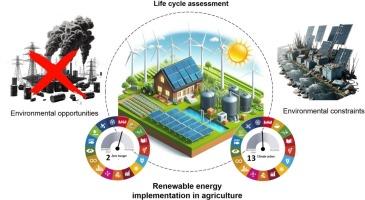对可再生农业系统生命周期评估的严格审查
IF 7.1
2区 工程技术
Q1 ENERGY & FUELS
Sustainable Energy Technologies and Assessments
Pub Date : 2024-11-25
DOI:10.1016/j.seta.2024.104100
引用次数: 0
摘要
将可再生能源技术融入农业为大幅减少碳排放提供了一种前景广阔的方法。农业本身就是能源密集型产业,在机械、灌溉、供暖、制冷和加工等各种作业中都大量依赖化石燃料。然而,这些系统本身也会对环境造成影响,并面临可持续发展的挑战,因此了解其对环境的总体影响至关重要。生命周期评估(LCA)对于分析这些影响至关重要。尽管存在一些不确定性,但生命周期评估方法提供了一种结构化的方法,可用于检查产品生命周期的每个阶段,使利益相关者能够确定需要改进的领域并做出明智的决策。本文以生命周期评估分析为重点,回顾了将可再生能源系统融入农业的环境机遇和局限性。与农业相结合的可再生能源系统显示出减少排放和化石能源需求的潜力。然而,许多研究主要关注能源生产,往往忽略了对环境的重大影响。有害物质的处理、风力涡轮机的噪音、能源作物的土地使用等关键数据经常被忽略,导致结果可能出现偏差。生命周期评估研究通常主要关注碳排放和全球变暖,经常强调可再生能源技术是可持续的解决方案。然而,对人类健康影响的关注却不够,特别是在从生产到处置和回收的各个阶段所释放的重金属等物质的毒性。应对与可再生能源系统相关的废物管理挑战,对于确保农业的长期环境完整性至关重要。未来的研究应旨在通过开展更全面的评估来填补这些空白,包括在农业可再生能源系统的整个生命周期中对生态系统和人类健康的影响。此外,还需要创新来改进可再生能源组件的回收和废物管理,同时推进农业中的能源存储和分散系统,并将生命周期评估作为确定最具可持续性解决方案的指导工具。最后,整合生命周期成本计算和社会生命周期评估对于评估农业采用可再生能源的广泛可持续性至关重要。本文章由计算机程序翻译,如有差异,请以英文原文为准。

A critical review of life cycle assessment of renewable agricultural systems
Integrating renewable energy technologies into agriculture offers a promising approach to significantly reducing carbon emissions. Agriculture is inherently energy-intensive, with substantial reliance on fossil fuels for various operations, including machinery, irrigation, heating, cooling, and processing. However, these systems come with their own environmental impacts and sustainability challenges, making it critical to understand their overall effect on the environment. Life cycle assessment (LCA) is vital for analyzing these impacts. Despite introducing some uncertainties, LCA methodologies provide a structured approach for examining every phase of the life cycle of a product, empowering stakeholders to identify areas for improvement and make informed decisions. This paper reviews the environmental opportunities and limitations of integrating renewable energy systems into agriculture, focusing on LCA analysis. Renewable systems integrated with farming show the potential to reduce emissions and fossil energy demand. However, many studies focus primarily on energy production, often overlooking significant environmental impacts. Critical data, such as the disposal of hazardous materials, wind turbine noise, and land use for energy crops, are frequently omitted, leading to potentially biased results. LCA research often focuses primarily on carbon emissions and global warming, frequently highlighting renewable energy technologies as sustainable solutions. Yet, there is insufficient focus on human health impacts, particularly the toxicity of substances like heavy metals released during various stages, from production to disposal and recycling. Addressing waste management challenges associated with renewable energy systems is essential to ensuring long-term environmental integrity in agriculture. Future research should aim to fill these gaps by conducting more comprehensive assessments, including the impacts on ecosystems and human health throughout the entire lifecycle of renewable energy systems in farming. Innovation is also needed to improve recycling and waste management of renewable energy components, along with advancing energy storage and decentralized systems in agriculture, with LCA serving as a guiding tool for identifying the most sustainable solutions. Finally, integrating life cycle costing and social LCA is vital for assessing the broader sustainability of renewable energy adoption in agriculture.
求助全文
通过发布文献求助,成功后即可免费获取论文全文。
去求助
来源期刊

Sustainable Energy Technologies and Assessments
Energy-Renewable Energy, Sustainability and the Environment
CiteScore
12.70
自引率
12.50%
发文量
1091
期刊介绍:
Encouraging a transition to a sustainable energy future is imperative for our world. Technologies that enable this shift in various sectors like transportation, heating, and power systems are of utmost importance. Sustainable Energy Technologies and Assessments welcomes papers focusing on a range of aspects and levels of technological advancements in energy generation and utilization. The aim is to reduce the negative environmental impact associated with energy production and consumption, spanning from laboratory experiments to real-world applications in the commercial sector.
 求助内容:
求助内容: 应助结果提醒方式:
应助结果提醒方式:


